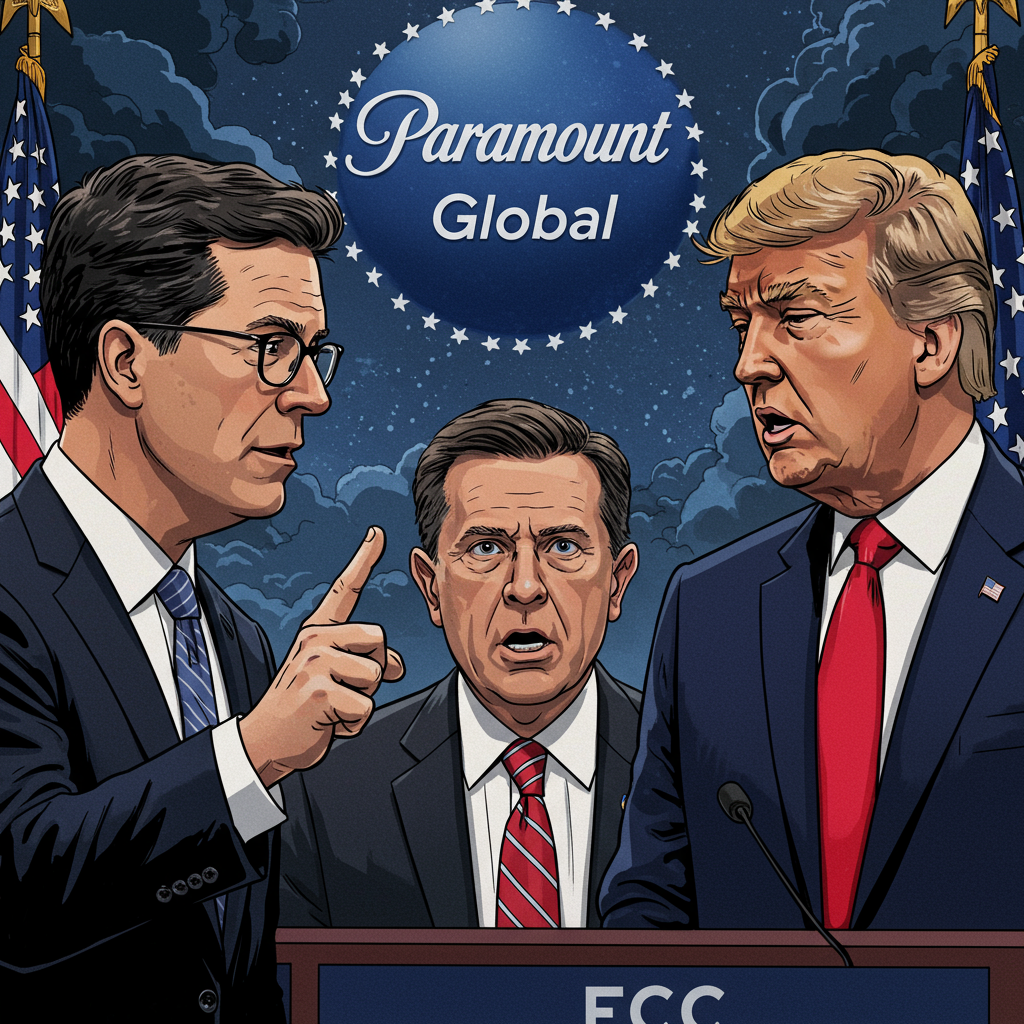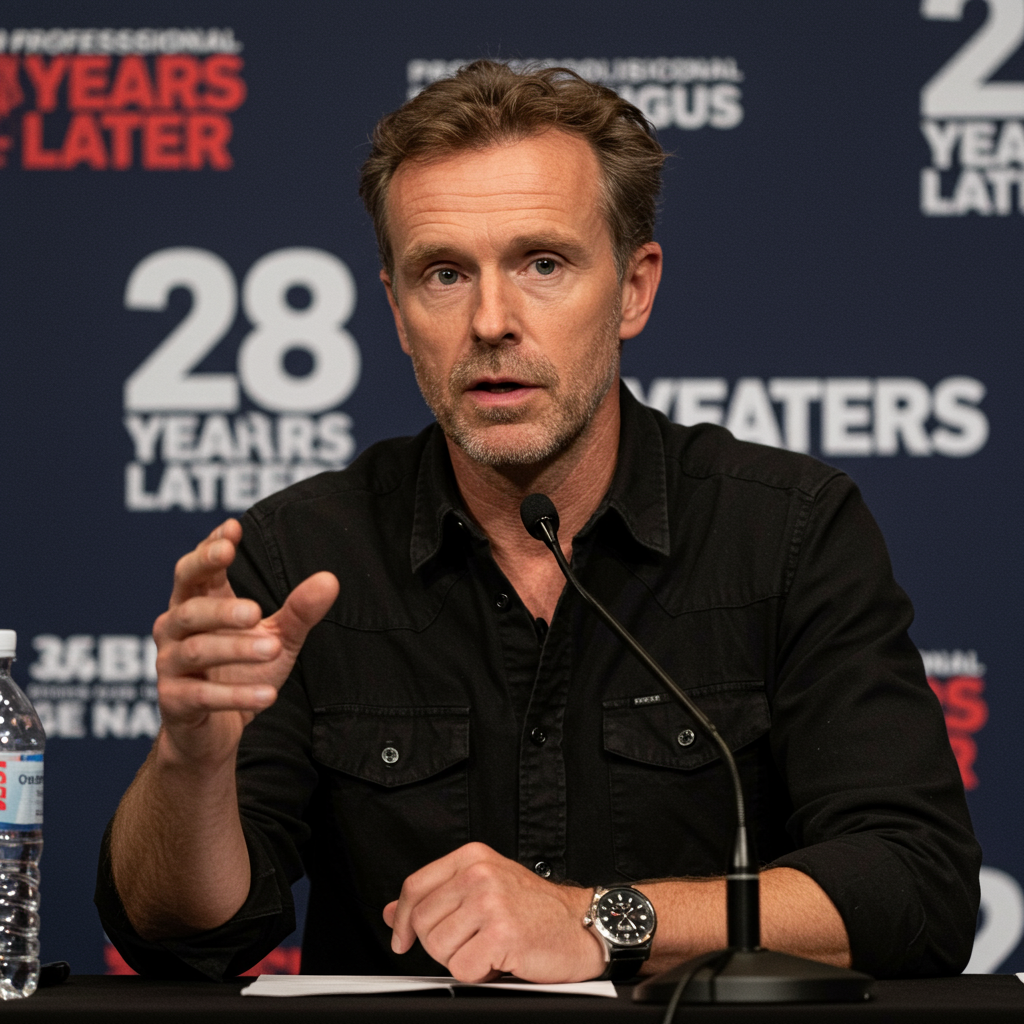The media landscape is currently navigating a tempest of political pressure, corporate ambition, and accusations of compromised integrity. At the heart of this storm lies Paramount Global, facing intense scrutiny over the controversial cancellation of The Late Show with Stephen Colbert and a highly questionable multi-million dollar settlement with former President Donald Trump. This confluence of events, heavily influenced by key figures like Trump-appointed FCC Chairman Brendan Carr, sparks critical questions about the future of journalistic independence and free speech in major media outlets, especially as Paramount seeks crucial regulatory approval for a massive merger.
The Controversial End of a Late-Night Era
Paramount Global’s decision to cancel The Late Show with Stephen Colbert after 32 years on CBS was officially attributed to “financial reasons,” with reports citing an annual loss of roughly $40 million. However, this justification has been met with widespread skepticism from industry observers, critics, and even fellow late-night hosts. Many question the timing, as the announcement came just three days after Colbert, a vocal critic of Donald Trump, publicly lambasted Paramount’s $16 million settlement with the former president, openly calling it a “big fat bribe.”
Donald Trump himself wasted no time celebrating the news on Truth Social, declaring his pleasure at Colbert’s firing and asserting, “His talent was even less than his ratings.” Trump’s comments extended beyond Colbert, as he ominously warned that Jimmy Fallon and Jimmy Kimmel could be next, claiming they too would be “on the chopping block.” The former president later took tacit credit for Colbert’s fate, stating he hoped he “played a major part in it” while deriding late-night hosts as “people with absolutely NO TALENT, who were paid Millions of Dollars for, in all cases, destroying what used to be GREAT Television.”
FCC Chairman Carr’s Divisive Commentary
Adding fuel to the fire, Brendan Carr, the Trump-appointed Chairman of the Federal Communications Commission (FCC), publicly mocked the fallout from Colbert’s cancellation. Carr took to X (formerly Twitter) to deride the “partisan left,” accusing them of “ritualist wailing and gnashing of teeth” over Paramount’s decision. He quipped that critics were acting “like they’re losing a loyal DNC spokesperson that was entitled to an exemption from the laws of economics.”
Carr’s comments are particularly significant given his agency’s pivotal role. The FCC is the regulatory body responsible for overseeing Paramount’s proposed $8 billion merger with Skydance Media, a deal that requires the Commission’s approval. His public statements, which mirrored Trump’s celebratory tone, raised eyebrows, highlighting the potential for political influence to bleed into regulatory processes. Notably, Carr had previously issued a public threat last year to impede the merger over the very “60 Minutes” segment that triggered Trump’s lawsuit.
The $16 Million Settlement: A “Big Fat Bribe”?
The core of the controversy stems from Paramount’s $16 million settlement with Donald Trump. This payout resolved a lawsuit Trump filed against CBS over a 2024 “60 Minutes” interview with Kamala Harris, which Trump alleged was “deceptively edited.” Despite CBS initially labeling the lawsuit “completely without merit,” Paramount entered mediation and agreed to the substantial sum. Paramount maintains the payment was for Trump’s future presidential library and not a personal payout, but no apology was issued to Trump.
The timing of this settlement, shortly before the Colbert cancellation and amidst the ongoing merger negotiations, has drawn severe criticism. Democratic Senator Elizabeth Warren launched an investigation into whether the settlement violated anti-bribery laws. Former “60 Minutes” producer Rome Hartman viewed the settlement as an “absolute betrayal” of journalistic principles, fueled by intimidation. The controversy has already led to high-profile resignations within CBS News, including President Wendy McMahon and “60 Minutes” executive producer Bill Owens, both of whom reportedly resisted the settlement, underscoring deep internal discord over the perceived compromise of editorial independence.
Late-Night Hosts Condemn Paramount’s Actions
Stephen Colbert himself did not hold back. Prior to the cancellation announcement, he had already labeled the Paramount settlement a “big fat bribe.” Following the news of his show’s cancellation, Colbert used his platform to directly challenge Paramount, alleging the decision was more about appeasing Trump than saving money. In a powerful segment featuring fellow late-night hosts Jimmy Fallon, Jimmy Kimmel, Seth Meyers, John Oliver, and Jon Stewart, Colbert directly referenced the bribery allegations through a satirical “Coldplay kiss cam” meme, depicting Trump embracing the Paramount logo. He also delivered a succinct, direct message to President Trump on air: “Go f— yourself.”
Jon Stewart, host of “The Daily Show,” issued his own strong condemnation of CBS. While acknowledging the financial struggles of late-night television, Stewart questioned why CBS would sacrifice its “No. 1 rated network late-night franchise” of over three decades. He argued that the cancellation was likely “the path of least resistance for your $8 billion merger” rather than a purely financial move. Stewart emphasized that the value of media corporations lies in content that “says something, shows that take a stand, shows that are unafraid.” He warned that creating “innocuous” or “flavorless” content to avoid controversy would ultimately lead to audience disengagement. Other hosts expressed their dismay, with Jimmy Kimmel pointedly tweeting, “Love you Stephen. F you and all your Sheldons CBS.”
The Looming Skydance Merger and Media’s Future
The backdrop to these events is Paramount’s ongoing $8 billion merger attempt with Skydance Media, a deal heavily reliant on FCC approval. The potential change in ownership amplifies concerns about the future of CBS News and its editorial direction. If the merger proceeds, billionaire Larry Ellison, a known ally of Donald Trump, is poised to exert significant influence behind the scenes at Paramount. Veteran CBS correspondent Marvin Kalb expressed profound alarm, fearing that CBS News, particularly “60 Minutes,” could fall under tighter editorial control and become “a little Fox,” timid in its critical reporting on Trump. Kalb presciently suggested that outspoken hosts like Colbert would not be renewed.
Further speculation includes reports of Skydance’s David Ellison discussing the acquisition of “anti-woke” online publication The Free Press, with co-founder Bari Weiss potentially shaping CBS News’ editorial sensibilities. This prospect drew sharp criticism from journalists, who questioned an opinion journalist’s suitability for guiding a news division. Even South Park creators Trey Parker and Matt Stone have publicly accused incoming Paramount president Jeff Shell of contractual meddling, describing the merger as a “shitshow.” The underlying fear is that powerful corporate interests, potentially aligned with political figures, could lead to a chilling effect on news coverage, undermining the vitality of independent journalism.
Trump’s Strategic Leveraging of Media Influence
The events at Paramount are not isolated but fit a pattern of Donald Trump leveraging his post-presidency influence against media organizations. Prior to the Paramount settlement, Trump secured a payout exceeding $15 million from Disney over a “This Week” segment on ABC, referencing his civil judgment for sexual abuse and defamation. These instances demonstrate Trump’s willingness to pursue substantial financial settlements and concessions from media companies, using legal threats as a strategic tool.
This dynamic also played out recently in the “Maga infighting” over the Jeffrey Epstein files, where Trump’s supporters grappled with the cognitive dissonance of new information contradicting long-held conspiracy theories. Late-night hosts, including Colbert, Stewart, and Meyers, satirized this internal conflict, highlighting how Trump’s base struggled to reconcile his narrative with reality. These incidents collectively paint a picture of a broader “moment of real peril for free voices and independent journalism,” where corporate interests and political pressures threaten to reshape the media landscape.
Frequently Asked Questions
Why is Stephen Colbert’s show being cancelled amidst controversy?
Stephen Colbert’s Late Show cancellation was officially cited by Paramount as a “purely financial decision” due to an estimated $40 million annual loss. However, the timing, just three days after Colbert strongly criticized Paramount’s $16 million settlement with Donald Trump, has led to widespread skepticism and accusations of political motivation. Critics, including Colbert himself and other late-night hosts, suggest the cancellation was a strategic move by Paramount to appease Trump and secure FCC approval for its $8 billion merger with Skydance Media, demonstrating a potential link between corporate finance and political influence.
What is the significance of the Paramount-Skydance merger to these events?
The proposed $8 billion merger between Paramount Global and Skydance Media is a critical factor influencing the controversy. This merger requires approval from the Federal Communications Commission (FCC), currently chaired by Trump-appointed Brendan Carr, who has openly mocked the Colbert fallout. The settlement with Donald Trump and the cancellation of his vocal critic, Stephen Colbert, are viewed by many as attempts by Paramount to smooth over potential regulatory hurdles and political opposition, particularly given Larry Ellison’s (a Trump ally) expected influence if the merger proceeds, raising concerns about compromised journalistic integrity for corporate gain.
How might these events impact journalistic independence in major media outlets?
These events highlight significant threats to journalistic independence. The $16 million settlement with Donald Trump, despite Paramount initially calling his lawsuit “without merit,” suggests a willingness to compromise for corporate expediency. High-profile resignations at CBS News further underscore this internal conflict. Critics fear that powerful corporate interests, especially when aligned with political figures like Trump and his allies (e.g., through Larry Ellison’s potential influence in the Skydance merger), could lead to increased editorial control, a “chilling effect” on critical reporting, and a shift towards less controversial, more “flavorless” content to avoid political scrutiny, ultimately eroding the public’s trust in major news organizations and limiting diverse voices.
In conclusion, the situation surrounding Paramount Global, the cancellation of The Late Show with Stephen Colbert*, and the controversial settlement with Donald Trump represents a deeply unsettling moment for media integrity. The interplay of political pressure, regulatory power, and corporate ambition raises profound questions about the future of independent journalism. As the Paramount-Skydance merger looms, the industry watches closely to see whether critical voices will continue to thrive or if financial and political pressures will ultimately silence them, potentially leading to a more homogenized and less accountable media landscape.


